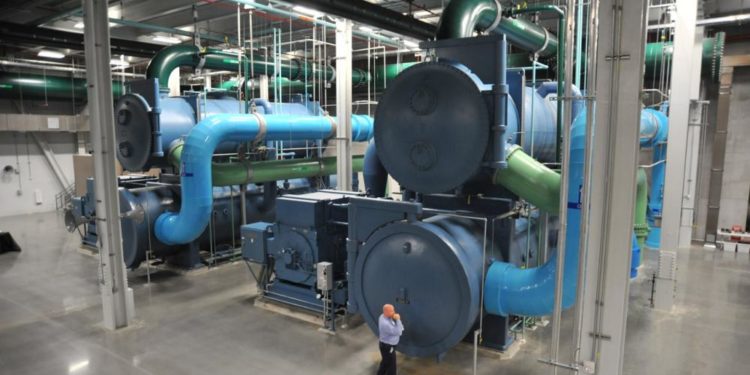Effective cooling is a key part of many industries, from manufacturing and food processing to pharmaceuticals and data centres. With rising demand for efficient and reliable cooling systems, water chiller units have become an increasingly popular choice. Their ability to handle high cooling loads while maintaining consistent performance makes them ideal for businesses that require precise temperature control.
Water chillers are changing the way industries manage cooling, offering a balance of efficiency, scalability, and long-term reliability. Whether for industrial production, climate control, or specialist applications, these systems provide a practical solution for keeping operations running smoothly.
The Growing Demand for Water Chiller Units
As industries expand and technology advances, the need for effective cooling has never been greater. Many businesses are moving in favour of water chiller units, particularly in environments where precision cooling is essential.
Water chillers work by circulating chilled water through a closed-loop system, removing heat from machinery, processes, or spaces. Unlike air-cooled units, which rely on external airflow, water chillers maintain consistent performance regardless of external temperatures. This makes them particularly well-suited for industries that require stable cooling year-round.
Why Water Chillers Are Gaining Popularity
One of the key reasons businesses are choosing water chiller units is their efficiency. Because they use water to absorb and transfer heat, they operate more effectively than air-cooled systems in many environments. Water has a higher heat capacity than air, allowing these chillers to remove heat more efficiently and maintain stable temperatures with less energy use.
For industries with high cooling demands, this efficiency translates into lower operating costs. Factories, production plants, and commercial buildings all benefit from reliable cooling that can be scaled to meet their specific requirements.
Water chillers are also known for their flexibility. They can be installed in a variety of configurations, including modular systems that allow businesses to expand their cooling capacity as needed. This makes them a smart investment for companies looking for a scalable cooling solution.
Industries Benefiting from Water Chillers
Water chiller units are used across a range of industries, each with its own cooling requirements.
- Manufacturing and production: Many industrial processes generate significant heat, which needs to be managed to prevent equipment from overheating. Water chillers provide consistent cooling, helping to maintain production efficiency.
- Food and beverage industry: Temperature control is essential in food production, storage, and processing. Water chillers help maintain the right conditions for food safety and quality.
- Pharmaceuticals and medical facilities: Laboratories and pharmaceutical production facilities require strict temperature regulation. Water chillers help maintain controlled environments for research, testing, and storage.
- Data centres and IT facilities: With the growing reliance on digital infrastructure, data centres need effective cooling to prevent servers from overheating. Water chillers provide reliable temperature control to keep systems running smoothly.
- HVAC and building cooling: Many commercial and industrial buildings use water chillers as part of their heating, ventilation, and air conditioning systems. These chillers provide efficient climate control, reducing energy costs while maintaining comfort.
The versatility of used industrial water chillers makes them a preferred option for businesses that require dependable cooling, regardless of the industry.
How Water Chillers Compare to Air-Cooled Systems
Choosing between water and air-cooled chillers depends on the specific needs of a business, but water chiller units offer several advantages.
Air-cooled chillers use ambient air to remove heat, which can make them less efficient in hot climates or areas with limited airflow. Water chillers, on the other hand, use a recirculating water loop, which maintains stable performance even in high-temperature environments.
Water chillers are also quieter than air-cooled models, as they do not require large fans to operate. This makes them a good option for facilities where noise levels need to be kept to a minimum.
While air-cooled chillers are often easier to install due to their self-contained design, water chiller units offer better long-term efficiency, particularly for businesses with high cooling demands. The initial investment in a water-cooled system is often offset by lower running costs and improved performance.
The Role of Glycol in Water Chiller Systems
For applications where temperature control is especially important, glycol-water mixtures are often used in chiller systems. Glycol, a heat-transfer fluid, helps prevent freezing in low-temperature conditions and improves overall system efficiency.
Industries such as food processing, breweries, and pharmaceutical production often rely on glycol chillers to maintain consistent cooling. These systems provide stable temperatures, reducing the risk of product spoilage or equipment damage.
The use of glycol in water chillers adds another layer of flexibility, allowing businesses to customise their cooling systems to meet specific requirements.
Choosing the Right Water Chiller for Your Needs
Selecting the right water chiller depends on several factors, including cooling capacity, space availability, and industry requirements. Businesses need to consider how much cooling power is required, as well as whether a modular system would be beneficial for future expansion.
Another important consideration is water quality. Since water chillers rely on a recirculating water loop, proper filtration and water treatment are essential to prevent scale build-up and maintain efficiency over time.
For businesses looking for a tailored solution, working with a supplier that offers a range of options is the best approach. Whether it’s a compact system for a small facility or a large-scale chiller for an industrial plant, having the right setup ensures reliable and cost-effective cooling.
The Future of Water Chiller Technology
Advancements in chiller technology continue to improve efficiency and reliability. Modern water chillers are designed with smart controls, allowing for automated adjustments based on real-time cooling demands. This helps businesses reduce energy consumption without compromising performance.
More companies are also integrating their chiller systems with renewable energy sources, such as solar power, to further cut operating costs. As industries focus on sustainable practices, water chillers are evolving to meet both environmental and economic demands.
Conclusion
Water chiller units are transforming industrial cooling by offering efficient, scalable, and reliable temperature control for a wide range of industries. Their ability to handle high cooling demands while maintaining consistent performance makes them a preferred choice for businesses looking for long-term solutions.
From manufacturing and food processing to data centres and commercial buildings, water chillers provide the cooling power needed to keep operations running smoothly. With continued advancements in chiller technology, businesses can expect even greater efficiency and flexibility in the years to come.










































































